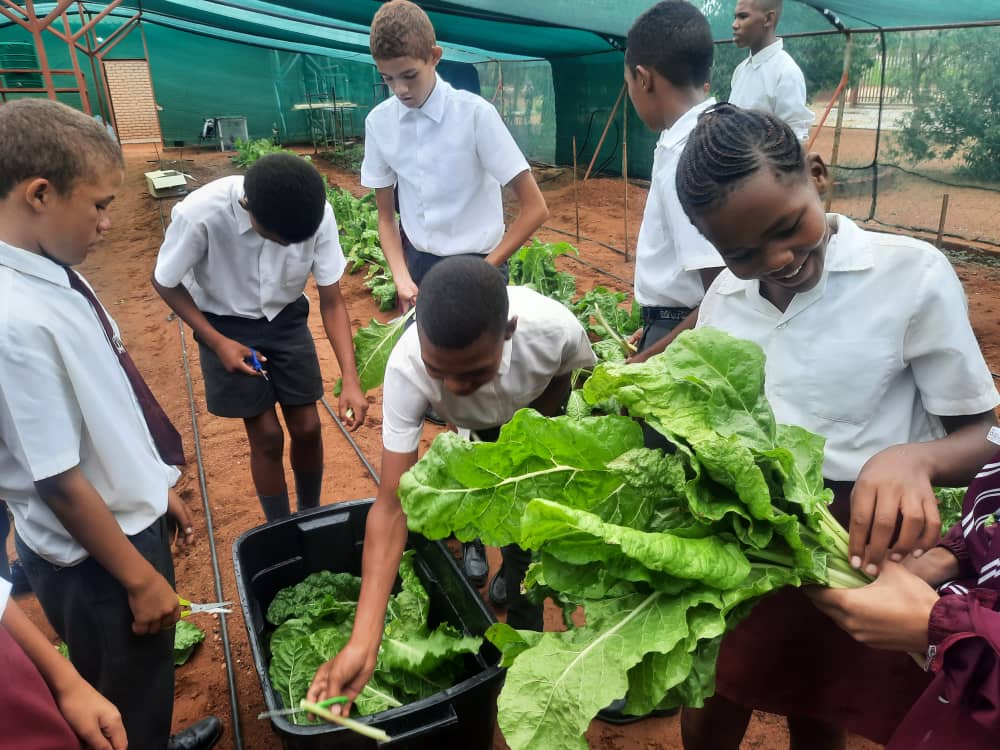After six years of existence, the Origo Primary School garden, Origo Fresh Produce, is finally selling its vegetables to the public. The school has become the first school at Rehoboth to sell fresh produce.
The school has two gardens. The first garden was established in 2019, aided by the Namibia Agronomic Board, and the second one was established in 2021. Origo is a government school, established at Rehoboth in 1870.
Agriculture teacher Levy Mbeava says the school is selling a variety of fresh vegetables such as cabbage, beetroot, lettuce, spinach, green pepper, onions, eggplant and carrots. He says all the items are sold at affordable prices to ensure accessibility for the community. The prices range between N$10 and N$20 per packet.
“This pricing strategy allows the community to access healthy food while supporting the sustainability of the garden. Currently, our main buyers are school parents and teachers who purchase fresh produce directly from the school. We use WhatsApp groups to advertise, allowing our agricultural committee to arrange pre-orders before harvesting. This system ensures efficient sales and reduces waste,” Mbeava says.
He says profits from sales are reinvested into the garden to cover essential costs such as purchasing seeds for the next planting cycle, buying organic pesticides and fertilisers to maintain healthy crops, acquiring garden tools and materials for expansion and maintenance, and occasionally buying groceries to supplement the soup kitchen.
Mbeava says this approach helps ensure that the garden remains productive and financially independent.
Agriculture teacher David Mwaala says they also often sell to the Rehoboth Community Trust, expanding their market reach.
“We started selling our fresh produce because we grow more than what is needed for our school’s soup kitchen. The production is divided as follows: 40% of the produce goes to the school’s soup kitchen, which helps provide nutritious meals to pupil in need, and 60% of the produce is sold to ensure that the garden can sustain itself,” Mwaala says.
He says to further improve accessibility, they are planning to establish a school farm shop. He says the shop will allow any community member to purchase fresh produce easily, increasing their impact and providing a stable source of income for the garden.
“This initiative not only supports the garden but also provides practical education that prepares pupils for future careers in agriculture and entrepreneurship. By participating in these activities, pupils develop valuable agricultural, business and financial skills,” Mwaala says.
Grade 7 pupil Acelecim Du Plessis says he is impressed by the success of the garden over the years. Du Plessis says he is glad to be learning new skills such as sales and harvesting fresh produce, which will be beneficial for his future.
“Being part of the garden has taught me about the importance of hard work. I also learned that if one commits to something then results will later be shown. Working in the garden is teaching me how to cultivate, produce and harvest my own food. I like this initiative because it allows me to work with friends,” Du Plessis says.
“I feel thrilled because the products continuously sells after many years, that means the product is efficient. It also shows that people like what we produce and it helps to grow the garden,” Grade 7 pupil Benicio Rittmann says.
Rittmann says being part of the initiative has taught him new skills and knowledge before. He says he is mainly pleased about learning about gardening, nature, insects, pests and gardening tools.
“When I grow up I would like to become a horticulturalist. I would love to have my own greenhouse as well,” he says.
Stay informed with The Namibian – your source for credible journalism. Get in-depth reporting and opinions for
only N$85 a month. Invest in journalism, invest in democracy –
Subscribe Now!










